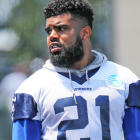Dallas Cowboys running back Ezekiel Elliott officially had his appeal denied by arbitrator Harold Henderson, which means we are headed headlong into another full-blown court case involving a star NFL player. Elliott was previously suspended six games by the NFL in mid-August for a domestic violence incident from 2016.
And in his letter to all the parties involved, obtained by CBS Sports Radio and WFAN legal analyst Amy Dash, Henderson claimed that commissioner Roger Goodell followed the process for imposing judgment "step by step."
Henderson noted that Elliott's team claimed there was new evidence, but it was not his job "to conduct a de novo review of the case and second guess" Goodell's decision.
"Henderson basically says that his job wasn't to decide whether Goodell made the right decision, only to decide whether Goodell followed proper procedures and had sufficient credible evidence to make any decision," Dash pointed out to CBSSports.com. "Henderson felt the record contained enough credible evidence to support Goodell's decision to issue a suspension."
Henderson believes that he should only be in charge of examining whether or not "the process and result were in compliance with the terms of that policy."
From the conclusion portion of the appeal:
As his designated Hearing Officer in this matter, my responsibility is to determine whether the Commissioner's decision on discipline of Mr. Elliott is arbitrary and capricious, meaning was it made on unreasonable grounds or without any proper consideration of circumstances. It is not the responsibility, nor within the authority of, the Hearing Officer to conduct a de novo review of the case and second guess his decision. Rather, the review is to determine whether the player was afforded adequate notice of his alleged violation, the right to representation, opportunity to present evidence, and a decision which is fair and consistent. In a case involving violation of a policy, fair and consistent means whether the process and result were in compliance with the terms of that policy. This one is, in every respect.
Here the process for imposing discipline outlined in the Policy has been followed closely, step by step. I find it unnecessary to reexamine all the evidence presented in this record because my careful and diligent review of everything the Commissioner reviewed and relied on draws me to the conclusion that the record contains sufficient credible evidence to support whatever determinations he made. He is entitled to deference on those judgments absent irregularities not present here. While the record contains inconsistencies in statements, an adjudicator makes informed judgments on the credibility of witnesses and evidence.
This seems like an odd way to handle an appeals process, right? The commissioner is in charge of appointing the arbitrator, but the arbitrator cannot question the commissioner's decision? Only whether or not fair process was followed? That's odd.
Also odd: Henderson has literally second-guessed Goodell before, in a case involving a Cowboys player who was suspended for a domestic violence incident. When Henderson reduced Greg Hardy's suspension from 10 games to four in the summer of 2015, he said straight up that Goodell gave him too harsh of a suspension.
Harold Henderson said in letter to Ezekiel Elliott it not his job to "second guess" Roger Goodell's discipline decision. But ..... pic.twitter.com/JaOWer79Ue
— Will Brinson (@WillBrinson) September 6, 2017
That is the definition of second guessing. Here is Henderson's full quote at the time:
After consideration of all the record evidence and arguments, I conclude that the Commissioner acted within his authority and properly exercised his discretion in finding that Hardy violated the NFL Personal Conduct Policy. I find that the conduct of Hardy clearly violates the letter and spirit of any version of the PCP since its inception, and of the NFL Constitution and Bylaws long before then. The egregious conduct exhibited here is indefensible in the NFL.
However, 10 games is simply too much, in my view, of an increase over prior cases without notice such as was done last year, when the 'baseline' for discipline in domestic violence or sexual assault cases was announced as a six-game suspension. Therefore, the discipline of Mr. Hardy hereby is modified to a suspension of four games; all other terms of the discipline letter remain in place.
There are many different layers to this kind of situation and all the inherent issues within. Henderson admitted there are concerns about the consistency of statements from all the parties here. The domestic violence policy is good, because it should help to curb guys doing bad things, but Goodell being able to mete out punishment however he sees fit is a net negative.
And the idea that someone hearing an appeal of discipline cannot reverse a punishment that is too harsh? That's the whole point of the appeal in the first place. It is especially difficult to swallow when you see that Henderson has clearly done just that in a very similar situation previously.
















